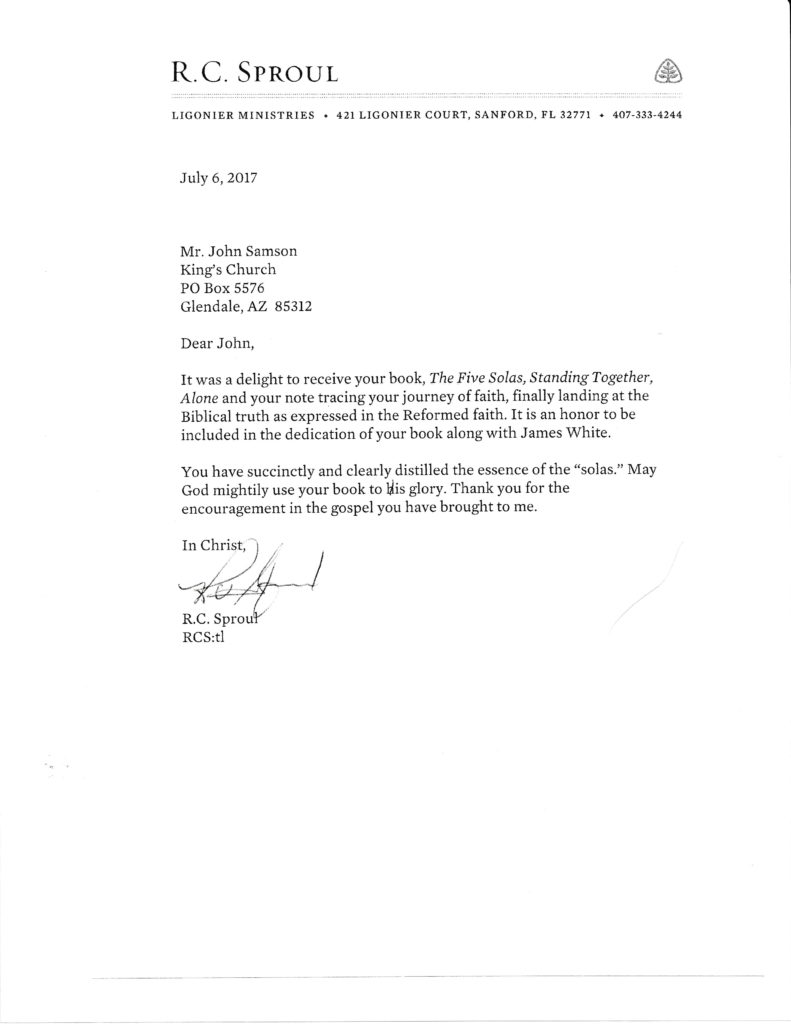I received a wonderful letter in the mail today from Dr. R.C. Sproul. It did my heart much good to learn I encouraged this man of God.


 “You should not believe everything you read on the internet.” – Abraham Lincoln
“You should not believe everything you read on the internet.” – Abraham Lincoln
“To worship God we must know who God is, but we cannot know who God is unless God first chooses to reveal himself to us. God has done this in the Bible, which is why the Bible and the teaching of the Bible need to be central in our worship.” – James Montgomery Boice
“The Covenant of Redemption is the covenant entered into by the persons of the Trinity in the councils of eternity, with the Son mediating its benefits to the elect. This covenant is the basis for all of God’s purposes in nature and history, and it is the foundation and efficacy of the covenant of grace.” – Michael Horton
“The Church is in duty bound to guard its holiness by the exercise of proper discipline. The purpose of discipline in the Church is twofold. In the first place it seeks to carry into effect the law of Christ concerning the admission and exclusion of members; and in the second place it aims at promoting the spiritual edification of the members of the Church by securing their obedience to the laws of Christ. Both of these aims are subservient to a higher end, the maintenance of the holiness of the church of Jesus Christ. If there are diseased members, the Church will first of all seek to effect a cure, but if this proves impossible, it will put away the diseased member for the protection of the other members. While all the members of the Church are in duty bound to warn and admonish the wayward, only the officers of the Church can apply Church censures. The latter can deal with private sins only when these are brought to their attention according to the rule given in Matt. 18:15-17, but are in duty bound to deal with public sins even when no formal accusation is brought.” – Louis Berkhof
“A doctrine concerning Scripture’s attributes developed in the Reformation churches as a counter to Roman Catholicism on the one hand and Anabaptism on the other. The key issue was the nature and extent of scriptural authority. Rome honors church and tradition above Scripture, while Anabaptism respects the inner word at the expense of the external word of Scripture. In Roman Catholicism the precedence of the church over Scripture eventually led to the dogma of papal infallibility. Here, materially, Scripture is unnecessary. Over against this position, the Reformers posited their polemical doctrine of Scripture’s attributes: authority, necessity, sufficiency, and perspicuity.” – Herman Bavinck
“The best evidence of the Bible’s being the word of God is to be found between its covers. It proves itself.” – Charles Hodge
“Grace … eliminates boasting; it suffocates boasting: it silences any and all negotiations about our contribution before they can even begin. By definition we cannot ‘qualify’ for grace in any way, by any means, or through any action.” – Sinclair Ferguson
“What will it cost a man to be a true Christian? It will cost him his self-righteousness. He must cast away all pride and high thoughts, and conceit of his own goodness. He must be content to go to heaven as a poor sinner, saved only by free grace, and owing all to the merit and righteousness of another.” – J. C. Ryle
“Don’t let your feelings inform your doctrine, let your doctrine inform your feelings.” – Burk Parsons
“God Himself supplies the necessary condition to come to Jesus, that’s why it is ‘sola gratia,’ by grace alone, that we are saved.” – RC Sproul
“The king’s heart is a stream of water in the hand of the LORD;
he turns it wherever he will.” – Prov. 21:1
“If Yahweh is sovereign over the greatest human will, He is sovereign over all human wills.” – Dan Phillips
“Doctrinal preaching certainly bores the hypocrites; but it is only doctrinal preaching that will save Christ’s sheep.” – J. I. Packer
“The Trinity is the basis of the gospel, and the gospel is a declaration of the Trinity in action. The Father purposing redemption, the Son securing it and the Spirit applying it.” – J. I. Packer
“To lay hold of and receive the gospel by a true and saving faith is an act of the soul that has been made a new creature, which is the workmanship of God… Wherefore whoever receiveth the grace that is tendered in the gospel, they must be quickened by the power of God, their eyes must be opened, their understandings illuminated, their ears unstopped, their hearts circumcised, their wills also rectified, and the Son of God revealed in them.” ~John Bunyan
“This is true religion, to approve what God approves, to hate what he hates, and to delight in what delights him.” – Charles Hodge
Dr. Kathy Koch has a saying that reflects the biblical thought Paul express in 1 Cor.15:33. She notes, “Show me your friends, and I will show you your future.”
“Rome often claims that it represents two thousand years of unbroken apostolic succession and practice. The implication is that no fundamental changes have taken place in the church, but only a legitimate development of principles found at the beginning. I believe that this historical claim is profoundly false, and that in the interests of truth and biblical religion it must be challenged.” – W. Robert Godfrey
Sin…
is a blind,
anti-God,
egocentric energy
in the fallen human spiritual system,
ever fomenting
self-centered and self- deceiving desires,
ambitions,
purposes,
plans,
attitudes,
and behaviors…
Remember that sin desensitizes you
to itself.
– J. I. Packer Continue reading
 Article by Dr. Sam Storms: 10 THINGS YOU SHOULD KNOW ABOUT JAMES ARMINIUS AND ARMINIANISM (original source here)
Article by Dr. Sam Storms: 10 THINGS YOU SHOULD KNOW ABOUT JAMES ARMINIUS AND ARMINIANISM (original source here)
Today we turn our attention to James Arminius and a few brief observations about the theological system that bears his name.
(1) Jacob Harmenszoon, better known to history as James Arminius, was born in Holland in 1559. His father died within a year of his birth and his mother, his brothers and sisters, and virtually all his relatives, were massacred in a raid on his home town of Oudewater in 1575. Arminius enrolled as a student of liberal arts at the University of Leyden in 1576 and concluded his studies in 1581. He went to study in John Calvin’s Geneva and enrolled at the Academy on January 1, 1582 (Theodore Beza, Calvin’s successor and Arminius’s primary instructor, was now 62). In 1583 he went to Basel, but returned to Geneva in 1584 and remained there until 1586.
(2) Arminius became pastor of a church in Amsterdam in 1587 and remained such until 1603. In 1588 be began preaching through Malachi and Romans. In 1591, when Arminius reached Romans 7, controversy erupted. During this period Arminius defended his view of Romans 7, contending that Paul spoke there as an unregenerate man. He believed that otherwise Christians would be encouraged to sin and would lack an incentive to holiness. When Arminius reached Romans 9 the controversy broke out in full force. He interpreted Jacob and Esau as types of classes of people, the former of those who seek righteousness by faith and the latter of those who seek it by works. Individual salvation through divine election is not in view.
(3) During the years 1598-1602 Arminius engaged in controversy with the English Puritan theologian, William Perkins (1558-1602), publishing a response to Perkins’ treatise on predestination. He also taught at the University of Leyden for six years (1603-1609), during which he waged theological war with Francis Gomarus (1563-1641).
(4) Arminius argued for the notion of preventing, exciting, or prevenient grace, by which is meant a work of the Holy Spirit in all men (and not just the elect) by which faith is made possible (but not necessary). Thus the question becomes, “Is grace irresistible?” Arminius says no.
(5) Arminius did not, as some contend, embrace the Pelagian doctrine of perfection from sin in this life. However, he never wholly repudiated the possibility either: “But while I never asserted that a believer could perfectly keep the precepts of Christ in this life, I never denied it, but always left it as a matter which has still to be decided” (I:256).
(6) As for the assurance of salvation, he affirmed that one may have present assurance of present salvation (I:255, 384-85). However, he denied that one can have present assurance of final salvation. If there is no present assurance of final salvation, it is because there is the possibility of falling from grace. In his work against Perkins he seems to say a believer could fall, but later spoke with more reserve. He argues that a person remains a living member of Christ unless he grows slothful and gives place to sin and little by little becomes half-dead. This, if not checked, results in spiritual death in which the individual ceases to be a member of Christ (III:282-525).
Yet in his Declaration of Sentiments he says that he never taught “that a true believer can either totally or finally fall away from the faith, and perish” (I:254). He tries to evade the issue by distinguishing between the elect and believers. One may be among the latter but not the former, since the elect always persevere. Continue reading